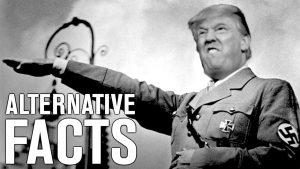The row over what is and what is not true among information disseminated by Donald Trump’s White House was renewed by the American president in his first week in office.
Trump and his press secretary, Sean Spicer, attacked the media for accurately reporting that fewer people were on the streets of Washington for his inauguration than for Barack Obama in 2009. (Obama, incidentally, never challenged the well-documented reality that he was way behind Ronald Reagan, who continues to hold the record for inaugural-day crowds.)
Trump also insisted without evidence that 3 million to 5 million votes were illegally cast in the November election, which caused him to lose the popular vote to his Democratic rival Hillary Clinton. The alleged voter fraud was rejected as a feat of narcissistic and petulant ill-logic even by members of his own Republican Party and by election officials, many in Republican-controlled states.
There are serious implications of the White House war on reality, which was described as “alternative facts” by one of Trump’s senior advisers, Kellyanne Conway.
First, it discredits the US president, his administration, the White House Press Office and any information that it swears to be true. In the future, if there are confused, confusing and contentious reports — about North Korean missiles or anything else from anywhere in the world — we can choose which source to believe — the Russians, the Chinese or the Americans. Few will automatically turn to the United States, as has been the case for more than half a century, as the one certain provider of truth and facts.
As Jim Sciutto, CNN’s chief national security correspondent, mused on camera to a listening world: “What if Donald Trump orders troops into battle and they die? Do we trust the White House to speak about that honestly… when real stuff starts happening?”
The second problem is that an American president, no less, is assisting a massive and popular disengagement from the facts.
This is disconcerting in a liberal democracy and ultimately it can delegitimise all authority but that of the demagogue and his loyal strong-armed tools of control. As Peter Wehner, who was a leading strategist in the George W. Bush White House, recently pointed out: “In the end you really can’t govern and you can’t persuade people, if you do not have a common basis of fact.”
Wehner, who is now at the Ethics and Public Policy Center, a conservative Washington-based think-tank, is no fan of Trump but there is more to his criticism than spite.
The Trump administration, of course, seems destined to continue down the make-believe paths set by the great man himself; on climate change being a Chinese hoax for instance; on the United States’ right — nay, responsibility — to take Iraqi oil as the price for protecting it; and that free trade ultimately equals the enslavement of US workers.
This is dangerously delusional and ultimately harmful to the democratic consensus, which needs a shared basis of objective facts for democracy to be exercised with good sense and produce generally good results.
But the United States’ 45th president appears to be stoking mistrust and misinformation all the better to control the narrative. If his voters, and others inclined to populism elsewhere, believe nothing other than his tweets, Trump will have succeeded in the biggest mass mind-bending initiative in history.
The territory is already prepared. A US study before the November election found that 68% of Trump supporters distrusted economic data published by the federal government. Clearly, experts are increasingly conflated with the elite and dismissed as mendacious manipulators, thereby making it difficult for people to make informed democratic choices.
So what is to be done? Can anything be done?
Perhaps the answer can be found by reaching far back in time — 10th-century Baghdad to be accurate — for lessons on how to evaluate the more complex issues of the day. Rather than arguing with those who distrust data, facts and the experts, it may be better to commend them for thinking for themselves.
In medieval times, the ulema were categorically not supposed to engage in taqlid, which means the “uncritical acceptance of authority”. Instead, they were charged with thinking deeply and critically for themselves. Some theologians in the Islamic world also believed that all Muslims — ulema or not — should think about what they believe — the existence of God for instance — and why.
By that token, in the 21st century, everyone — pro-Trump, pro-Brexit and anti-Trump, anti- Brexit — should insist on thinking for himself or herself. No one should engage in taqlid, whether it comes from Trump or anyone else.
Democracies need citizens to train themselves to be good judges of expertise. From the schoolroom to church, mosque and temple, from television screens to newspapers and Facebook posts, the war on taqlid must be joined. It may be the most important fight of our lives.


